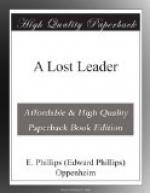“I have brought the whiskey and soda, sandwiches and cigarettes, sir,” he announced. “I am sorry to say that there is a person outside whom I cannot get rid of. His name is Fardell, and he insists upon it that his business is of importance.”
Mannering smiled.
“You can show him up at once,” he ordered; “now, and whenever he calls.”
Fardell appeared almost directly. Mannering had seen him before during the day, but noticed at once a change in him. He was pale, and looked like a man who had received some sort of a shock.
“Come in, Fardell, and sit down,” Mannering said. “You look tired. Have a drink.”
Fardell walked straight to the tray and helped himself to some neat whiskey.
“Thank you, sir,” he said. “I—I’ve had rather a knockout blow.”
He emptied the tumbler and set it down.
“Mr. Mannering, sir,” he said, “I’ve just heard a man bet twenty to one in crisp five-pound bank-notes that you never sit for West Leeds.”
“Was he drunk or sober?” Mannering asked.
“Sober as a judge!”
Mannering smiled.
“How often did you take him?” he asked.
“Not once! I didn’t dare!”
Mannering, who had been in the act of helping himself to a whiskey and soda, looked around with the decanter in his hand.
“I don’t understand you,” he said, bewildered. “You know very well that the chances, so far as they can be reckoned up, are slightly in my favour.”
“They were!” Fardell answered. “Heaven knows what they are now.”
Mannering was a little annoyed. It seemed to him that Fardell must have been drinking.
“Do you mind explaining yourself?” he asked.
“I can do so,” Fardell answered. “I must do so. But while I am about it I want you to put on your hat and come with me.”
Mannering laughed shortly.
“What, to-night?” he exclaimed. “No, thank you. Be reasonable, Fardell. I’ve had my day’s work, and I think I’ve earned a little rest. To be frank with you, I don’t like mysteries. If you’ve anything to say, out with it.”
“Right!” Richard Fardell answered. “I am going to ask you a question, Mr. Mannering. Go back a good many years, as many years as you like. Is there anything in your life as a younger man, say when you first entered Parliament, which—if it were brought up against you now—might be—embarrassing?”
Mannering did not answer for several moments. He was already pale and tired, but he felt what little colour remained leave his face. Least of all he had expected this. Even now—what could the man mean? What could be known?
“I am not sure that I understand you,” he said. “There is nothing that could be known! I am sure of that.”
“There is a person,” Fardell said, slowly, “who has made extraordinary statements. Our opponents have got hold of him. The substance of them is this: He says that many years ago you were the lover of a married woman, that you sold her husband worthless shares and ruined him, and that finally—in a quarrel—he declares that he was an eye-witness of this—that you killed him.”




